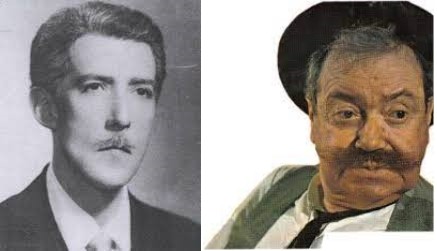Francisco Guerra (Pancho Guerra) y su personaje Pepe Monagas.

El Niño Cabezudo
Francisco Guerra Navarro (San Bartolomé de Tirajana, Gran Canaria, 11 de junio de 1909-Madrid, 3 de agosto de 1961) conocido como Pancho Guerra, fue un escritor y periodista español.
Realizó estudios de Bachillerato en Las Palmas de Gran Canaria, donde vivió hasta que en 1947 se trasladó a Madrid, donde permaneció hasta su muerte debida a un fallo cardíaco.
Pancho Guerra nació en San Bartolomé de Tirajana, localidad ubicada en el sur de Gran Canaria, también llamada Tunte. Muy pronto fue enviado a Las Palmas de Gran Canaria a estudiar bachillerato. Terminado este, comenzó los estudios de Derecho, que abandonó por el Periodismo. Entra en El Diario de Las Palmas con 21 años. Al inicio de la Guerra Civil es movilizado, y a su retorno del frente retorna a sus estudios de Derecho, que abandona nuevamente tras solo 3 meses en la universidad, para dedicarse definitivamente al periodismo. En 1947 se traslada a Madrid para desarrollar su actividad periodística. 1
Su vocación literaria se manifestó con 18 años y sus primeros escritos nacieron con un marcado ambiente costumbrista.
A su muerte dejó sin terminar su obra Léxico Popular de Gran Canaria. Esta fue acabada gracias al empeño de sus amigos de la “Peña Pancho Guerra”, y en particular de Miguel Santiago Rodríguez, en quien recayó la tarea de recopilar todos los apuntes que había dejado el autor y publicarla con el título Contribución al léxico popular de Gran Canaria.
ENGLISH
Francisco Guerra Navarro (San Bartolomé de Tirajana, Gran Canaria, 11 June 1909-Madrid, 3 August 1961), known as Pancho Guerra, was a Spanish writer and journalist.
He studied high school in Las Palmas de Gran Canaria, where he lived until 1947, when he moved to Madrid, where he remained until his death due to heart failure.
Pancho Guerra was born in San Bartolomé de Tirajana, a town in the south of Gran Canaria, also known as Tunte. He was soon sent to Las Palmas de Gran Canaria to study high school. When he finished, he began to study law, which he abandoned in favour of journalism. He joined El Diario de Las Palmas at the age of 21. At the beginning of the Civil War he was mobilised, and on his return from the front he returned to his Law studies, which he abandoned again after only 3 months at university, to devote himself definitively to journalism. In 1947 he moved to Madrid to pursue his journalistic activity. 1
His literary vocation manifested itself at the age of 18 and his first writings were born with a marked costumbrista atmosphere.
When he died, he left unfinished his work Léxico Popular de Gran Canaria (Popular Lexicon of Gran Canaria). It was finished thanks to the efforts of his friends from the «Peña Pancho Guerra», and in particular Miguel Santiago Rodríguez, who took on the task of compiling all the notes left by the author and publishing it under the title Contribución al léxico popular de Gran Canaria (Contribution to the popular lexicon of Gran Canaria)
Translated with www.DeepL.com/Translator (free version)
